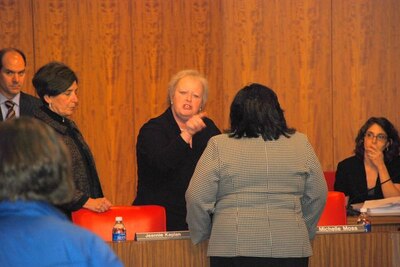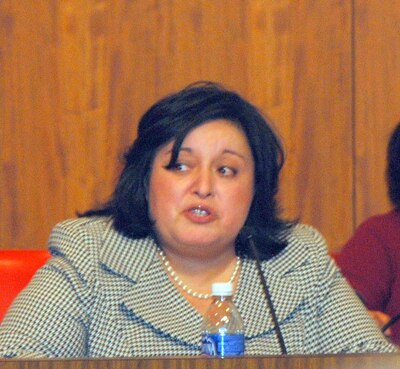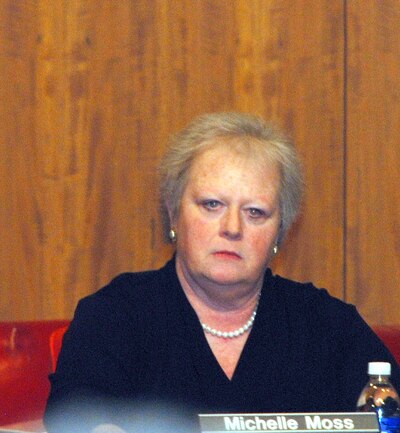
Denver Public Schools’ board members narrowly approved turnaround plans for six of its lowest-performing schools in a Monday meeting marked by the threat of legal action and a last-minute bombshell that forced out a veteran board member.
As board member Michelle Moss walked up to take her seat for what was to be her last meeting in eight years representing southwest Denver, her newly elected replacement Andrea Merida told her that she would be sitting on the dais instead.
Merida, rather than waiting to take the oath of office with two other new members after the meeting, had instead been sworn in hours earlier so she could cast a vote on the controversial reforms.
A shocked Moss reacted with tears and anger.
“I worked very hard to get Andrea elected … and I cannot imagine someone going behind my back and doing what she did today,” she told the standing-room-only audience before leaving.
Merida later offered apologies to Moss but said, “This is about the people’s wishes being heard.”
Merida and Moss disagreed about the most contentious reform proposal targeting the district’s lowest-performing secondary school, Lake Middle in northwest Denver. Moss supported it; Merida did not.
“The reason why I decided ultimately to act in this way was because one of the cornerstones of my platform as I was running was community engagement,” Merida said. “These turnaround strategies … they lack the central issue, the central necessary point of having had the community along for the ride.
“We cannot get to the business of educating children, not Latino children, not any children, if we don’t have families and communities along for the ride.”
Legality of votes questioned
Despite Merida’s vote, however, the Lake proposal was approved 4-3, with board members Arturo Jimenez and Jeanne Kaplan joining Merida in opposing it.
But Merida said she expects a legal challenge to that vote and all others taken by the board on Monday.
“There are significant legal questions as to whether or not the decisions that were made tonight actually will hold up,” she said. “There is precedent that could overturn it.”
She cited an opinion from Mark Grueskin, a prominent Denver attorney whose clients have included Gov. Bill Ritter and the Colorado Education Association.

Grueskin said Colorado courts have frowned on outgoing or “lame duck” school boards acting on policy matters, naming a 1971 Colorado Supreme Court ruling overturning a board’s decision to hire a new superintendent four days before a new board was sworn into office.
“There is no reason to think that the broad policy questions to be addressed tonight would be viewed any differently,” Grueskin wrote in a letter to Merida dated Nov. 30.
Merida said she did not plan to pursue the issue in court but others will.
“I know there are people who want to do that,” she said. “I feel certain that it would come from the community.”
Political consultant Steve Welchert, who connected Merida and Grueskin on Saturday, said “Voters have spoken and the voters’ voice is Andrea Merida, not the old board.”
Merida defeated her opponent, Ismael Garcia, by 116 votes out of 10,854 votes cast.
“The hubris here is from the old board who thinks they can come in here and ram down the throats of everybody 17 issue items an hour before they swear in a new board,” Welchert said. “Who thinks they get to do that?”
DPS says votes legal
DPS attorney John Kechriotis said Merida’s decision to be sworn in earlier than scheduled was legal.
After Denver Clerk & Recorder Stephanie O’Malley certified the election results Nov. 19, Kechriotis said Merida – along with new board members Nate Easley and Mary Seawell – needed only to take the oath of office before officially serving on the DPS board.
Merida did so before Denver District Judge Larry Naves shortly before noon, well before the scheduled 7 p.m. swearing-in of new board members at DPS headquarters.
Easley and Seawell said Merida did not tell them of her plans before she entered the board room about 4 p.m. Monday. That’s also when Kechriotis said DPS learned that Merida had taken the oath.
But Kechriotis said there’s no basis for concluding the actions taken by the DPS board Monday were not legal.
All seven board members who voted – including Merida – were legally carrying out their elected duties, he said.
“Nate and Mary … could have done what Merida did,” Kechriotis said, “but they haven’t.”
Grueskin, in his opinion for Merida, said a district’s authority to act during a “lame duck” period was limited to administrative purposes only, not policy questions.
Kechriotis said the board’s actions Monday were administrative. The board acted on 32 separate items, ranging from closing schools to recognizing former DPS Superintendent Evie Garrett Dennis by naming the new Green Valley Ranch ECE-12 campus in her honor.
Reform plans get go-ahead
Board members approved a series of reform proposals with minor changes and little discussion save for occasionally heated remarks about the Lake plan. Among the approved reforms for six of the district’s lowest-performing schools, three traditional and three charter:
- Lake will re-start its International Baccalaureate program with a small 6th-grade academy led by a new principal. A campus of West Denver Prep middle school charter, the district’s highest-performing middle school, will move into the Lake building.
- Philips Elementary School in northeast Denver will close and Odyssey Charter School, now sharing a district building in Stapleton, will move into the Philips building.
- Greenlee K-8 School will re-start as a K-5 school with a new principal and a new comprehensive literacy program.
- Skyland Charter School will close after this year and P.S. 1 Charter School will operate one more year before closing. Northeast Academy Charter will partner with an education management organization.
Board members did vote to alter a recommendation in northwest Denver calling for two West Denver Prep campuses to be located less than two miles from each other. Instead, one campus will go into Lake while the board must decide the location of the second campus within 30 days.
“No one is going to be happy in northwest Denver with this compromise necessarily,” said Jimenez, who represents the area, “but I think everyone can agree that it’s better than the proposal that was on the table previously.”
He and Kaplan both expressed concern that the district’s plans for the northwest area were incremental and did not take all of its schools into consideration.
For example, community members had expressed concern that the two West Denver Prep campuses so close together would pull students from Skinner Middle School, which enrollment is already low.
“My concern with these decisions that we’re making is that we’re not making a sector plan,” Kaplan said, “and I’m concerned that Skinner, for example, isn’t part of this turnaround strategy.”
Other board members said Lake’s history of dismal achievement – one in five students is reading at grade level – made dramatic change necessary.
Some community members argued against placing a West Denver Prep campus at Lake, preferring instead that the district simply reinvigorate the school’s IB program.
But board member Jill Conrad said IB programs in middle schools across Denver haven’t shown the ability to accelerate student growth that West Denver Prep has.
“The proposal isn’t just about where to locate a charter school,” Conrad said. “This proposal, and the very concept of turnaround itself, is about getting serious about matching real, timely, effective solutions to the actual academic needs of students based on data.”
A new board president
Merida’s unexpectedly early seating on the DPS board resulted in votes split 4-3 on the most disputed decisions, with Merida, Kaplan and Jimenez typically voting together.
After the other new board members were seated, that block held on the only issue discussed by the completely new board – the electing of officers.
Easley and Seawell sided with veteran board members Theresa Pena and Bruce Hoyt in declining to delay a vote on selecting a board president.
By secret ballot, the board then nominated three members for president – Jimenez, Kaplan and Easley. Four votes were required to pick a winner and, again by secret ballot, Easley was named to the top seat.
Whether Jimenez, Kaplan and Merida will remain a vocal minority remains to be seen.

Before Monday’s meeting, relations on the board already were strained by last month’s election, something Merida alluded to early in her comments about Moss.
“It is true that she did support me under much duress, under much pressure from some members of this board to not support me during the election,” Merida said. “It is with her help that I am here.”
Moss was not in a forgiving mood Monday night, despite Merida’s conciliatory remarks.
She said Merida’s action in ousting her early from the board, which she believed was assisted by Jimenez and Kaplan, is “a clear indication that they will stop reform and do whatever it takes to get their way.”
“For me, it’s a sad, sad day in Denver,” Moss said, “because now it’s about the adults in this district, not the kids.”
Nancy Mitchell can be reached at nmitchell@pebc.org or 303-478-4573.
Click here to see DPS’ press release on the recommendations approved Monday.
